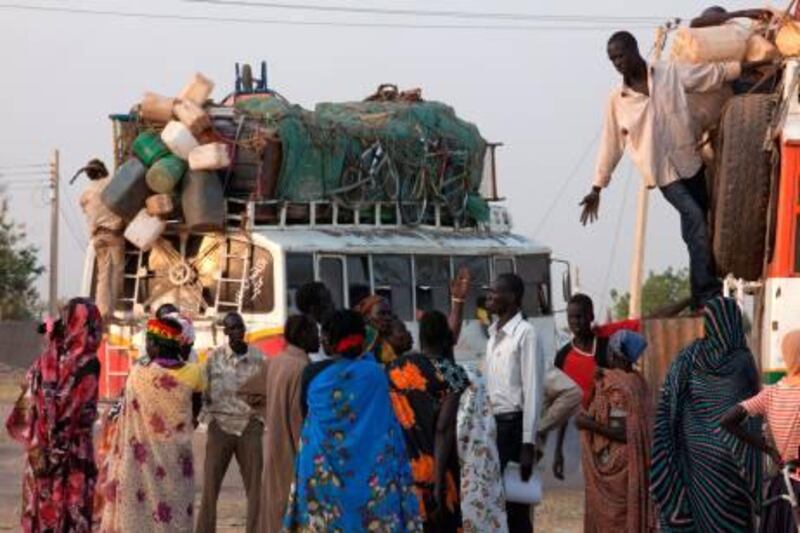AWEIL // As tens of thousands of Southern Sudanese stream home from northern Sudan in the aftermath of the oil-rich region's independence vote, the biggest challenge many face is not what they find when they arrive. The hardest part comes before the southerners even reach their homeland, on the perilous north-south journey itself.
UN agencies have recently reported multiple attacks on convoys of buses plying several routes through central Sudan, with the most serious incidents taking place near the border hot spot of Abyei, one of several unresolved flashpoints in the country's north and south.
On January 9, the day Southern Sudanese headed to the polls cast their self-determination vote, a convoy of more than 20 buses with at least 800 southern men, women, and children aboard came under attack as it headed south through Southern Kordofan state, which lies north of the north-south border and the disputed Abyei zone.
According to UN internal reports and to witnesses from the convoy, shots were fired at the buses by members of the Misseriya tribe, who ambushed the convoy as it passed through the village of Siteb, roughly 80 kilometres north-west of Abyei.
The shots were apparently warning calls, but the armed men proceeded to loot the buses, demanding that the Southern Sudanese aboard hand over their mobile phones, jewellery and other valuables.
Meanwhile, luggage on top of the buses — mattresses, metal bed frames, plastic chairs, suitcases — was off-loaded by the raiders, who were apparently not deterred by the presence of northern security forces providing escort to some of the buses in the long convoy.
Southern officials in the southern capital of Juba initially reported that 10 people had been killed in the attack on January 9, but UN sources were only able to confirm the death of one woman, who was reportedly stabbed to death after refusing to give up her mobile phone to the raiders.
Athou Ahmed Mohammed, a northern Sudanese bus driver who was part of the convoy, said: "They were youth with guns who came on motorbikes. They brought their women to help with the looting."
After the ambush, the convoy turned back north and most of the buses spent more than two weeks at a "way station" run by the UN's International Organisation for Migration in Kadugli, capital of Southern Kordofan state. According to a UN assessment, about half of the more than 80 families interviewed in Kadugli reported that they were looted and others reported missing family members after the attack.
As voting in the week-long referendum proceeded peacefully in the south, attacks on buses continued as convoys attempted different routes through and to the east and west of the Abyei territory. UN reports indicate shots were fired on a convoy on January 17 as it passed through the oil fields in Diffra, just north of the Abyei territory.
Several days after the January 9 attack, the government of Southern Kordofan state closed two of the routes leading south, and the United Nations reported that the southern "government-organised returns" were suspended due to the insecurity.
In several other locations north of Abyei, the southerners that had begun their journey and had come under attack remained marooned as they awaited a decision of a high-level security meeting in Kadugli on January 17, which brought together the top leadership of the UN mission in the country, the interior ministers from north and south, and representatives of the northern and southern armies.
Ahmed Haroun, the governor of Southern Kordofan state, hosted the meeting. Mr Haroun is wanted for war crimes by the International Criminal Court, who is seeking to try him for his role in organising militias often referred to as the "Janjaweed" to back the northern military's campaign of terror in the western region of Darfur.
A common perception among southerners is that the governor is up to the same tricks again, organising angry Misseriya tribesmen to conduct a campaign of violence against southern returnees and the black Ngok Dinka people of Abyei. The Misseriya tribesmen are concerned they will be abandoned by the Khartoum government if the Abyei territory is given to the south.
The January 17 meeting produced an agreement to reopen the two closed routes passing near and through Abyei so that the returns process could continue, and leaders from the north and south agreed on security arrangement for the convoys currently stuck in Southern Kordofan and for future convoys. Ten days later, the routes remain closed and the few buses arriving in the southern states of Northern Bahr al Ghazal and Warrap, which border Abyei, are taking huge detours to avoid the embattled Abyei zone.
The agreement is contingent upon a number of adjustments to the security provisions in the Abyei territory, none of which has happened since the January 17 meeting.
Accusations have begun to fly on local radio stations and in Sudanese press between Misseriya leaders whose youth may be blocking the routes and Ngok Dinka chiefs who committed in a separate local agreement earlier this month to allow the Misseriya safe passage for grazing southward with their cattle, after clashes earlier this month in Abyei called the upcoming Misseriya migration into question.





